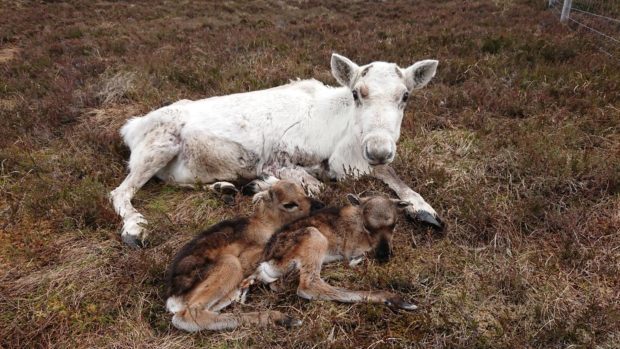It is definitely something to Shout about.
Lulu the reindeer has produced her herd’s first surviving twin calves in its 66-year history.
The pair of male calves were born to their 12-year-old mum two weeks ago at the family-run business, the Cairngorm Reindeer Herd, on May 8 and have remained at their mother’s side on the mountains since.
The twins are the fourth set to be born at the centre in Aviemore but are the only ones to have survived.
Three decades ago, the centre welcomed their first set of twins, with one stillborn and the other surviving for just 12 hours. A further two sets of twin calves were welcomed into the family in 2008 and 2015 but both died during the birth.
Herder Fiona Smith spoke of the rare occurrence and their joy at welcoming the new arrivals.
She said: “It’s very rare. There was one recording in Finland in 2010 and they were hand reared. We have had stillborn calves in the heard on three other occasions in 66 years.
“I was completely shocked. I’m thrilled now but I was completely shocked at the time.
“We can never predict it. Lulu is 12 years old, she’s the oldest female we have and this will probably be the last calves for her age. She is the size of a bus and she could have had a small calf or been the size of a bus and had twins. You just never know.”
The young calves spent their first two weeks in the north in their mountain enclosure feeding from their mother; with herders giving her a helping hand with feeding her young.
She added: “They were born up in the mountain enclosure and have been there for two weeks. We have been giving a helping hand for the first week encouraging them to suckle from their mother. We quickly realised she wouldn’t manage to feed two of them so we have been helping with the feeding of her calves.
“They are doing really well and really strong. The larger one has first dibs on the milk meanwhile the little one has been keeping up with the feeds. We have been going in there and offering them a bottle of milk to top them up.”
The young family are expected to return to their enclosure for three months over the summer to prevent them from contracting ticks.
